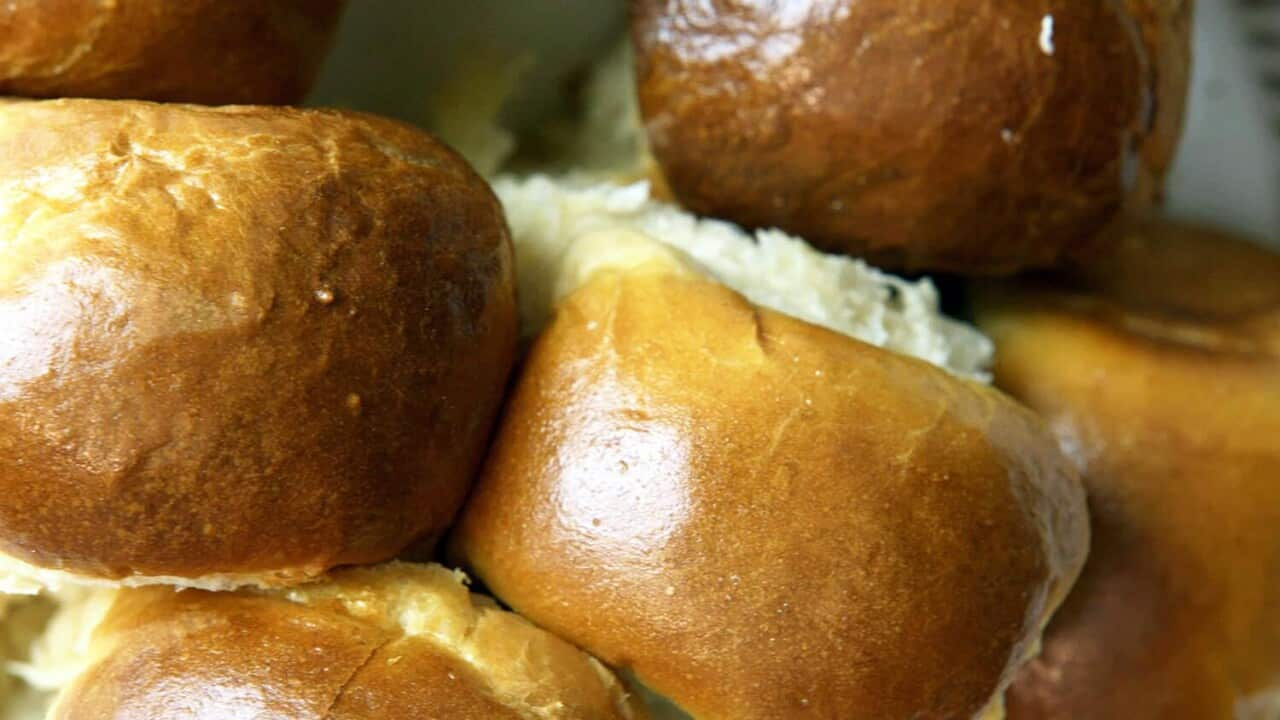Yutaka Miyamoto arrived in Sydney in 1982 with a single Boston bag. Born to a family of bakers, he was invited by Japanese expats to Australia to inspect the possibility of opening a Japanese bakery in Sydney.
Mr Miyamoto remembers the shock when he first tasted Australian bread.
"Australian bread was much harder and bland, unlike the sweeter, softer Japanese bread."
"The flour itself was very different. The flour used in Australia was like the flour used for udon." It took Miyamoto many trial and errors with Australian flour to produce the Japanese bread his community longed for. While getting his recipe right in a foreign country was a challenge on its own, the "bread culture" in Australia was also very different, he adds.
It took Miyamoto many trial and errors with Australian flour to produce the Japanese bread his community longed for. While getting his recipe right in a foreign country was a challenge on its own, the "bread culture" in Australia was also very different, he adds.

Yutaka Miyamoto, Fuji Bakery, Killarney Heights Sydney Source: Yusuke Oba
"I was repeatedly told that bread should complement a meal, that it shouldn't have much taste."
Many in the Australian community thought Japan was an only-rice-eating nation. Nobody believed me that there were many bakeries in Japan.
Japan was first introduced to bread in 1543, when the Portuguese arrived in Tanegashima, South of Japan. The Japanese call their bread pan from the Portuguese word for bread, pão.
FLOUR AND WATER

How flour and water became the world's obsession
Miyamoto's two-week inspection in Australia became three months and then a year.
"The airfare was costly back then, so the owner wanted me to stay and help open the bakery," he tells SBS Food.
Kobe Bakery opened its door in 1982 at Northbridge Plaza in Sydney's North Shore.
Although Miyamoto spoke little English, he never doubted his skill in baking. Trying to find his place in the Australian bread market, Miyamoto worked tirelessly for the one year he was contracted. By the end, he even had a 16-year-old apprentice working by his side. His bread also comforted the Japanese community, who longed for anpan (azuki bun) and doughnuts (azuki doughnuts). These were sold by the hundreds on the weekends, as Japanese from all over town flocked to get their hands on freshly baked azuki goodies.
His bread also comforted the Japanese community, who longed for anpan (azuki bun) and doughnuts (azuki doughnuts). These were sold by the hundreds on the weekends, as Japanese from all over town flocked to get their hands on freshly baked azuki goodies.

Azuki bun (left) and curry bun (right) are the staple of Fuji Bakery Source: Yusuke Oba
Miyamoto opened Fuji Bakery in 1984 after parting ways with Kobe Bakery and moved to its current location in Killarney Heights in 1987. While the Australian people slowly accepted Miyamoto's bread, racism remained in some of the community. Miyamoto recalls returning to work one morning in 1989 to find faeces smeared across his shop front, with the words "Go Home Asian".
While the Australian people slowly accepted Miyamoto's bread, racism remained in some of the community. Miyamoto recalls returning to work one morning in 1989 to find faeces smeared across his shop front, with the words "Go Home Asian".

Fuji Bakery, Killarney Heights Sydney Source: Yusuke Oba
"That was the first time I closed my shop."
Despite feeling down, he remembers the kind neighbouring shop owners helping him with the cleanup. "There are both good and bad people in this world."
The many hardships Miyamoto experienced through the years never deterred him from his passion. Although his son, Akira, has taken over the business, Miyamoto continues doing what he has been doing for almost four decades. Miyamoto has always been a people's baker, listening to the voices of the community. The varieties offered at Fuji Bakery have exploded over the years as Miyamoto kept hearing and adding to his repertoire.
Miyamoto has always been a people's baker, listening to the voices of the community. The varieties offered at Fuji Bakery have exploded over the years as Miyamoto kept hearing and adding to his repertoire.

Source: Yusuke Oba
From his famous curry bun (curry-filled bread, lightly covered in panko and deep-fried), to melonpan (melon-shaped bread covered in a thin layer of cookie crust) and butter roll, there is a variety of pastries, cakes, pies, cookies and even wagashi (traditional Japanese sweets). While the taste has remained the same over the four decades, more and more Australians are returning for his bread, with Japanese clientele making up only 10%.
While the taste has remained the same over the four decades, more and more Australians are returning for his bread, with Japanese clientele making up only 10%.

Source: Yusuke Oba
"Most of our customers have been coming for many, many years. They are here for the same taste."
Miyamoto says he will continue to bake by Akira's side if his body allows him. He is also eagerly awaiting for his youngest daughter to return from Japan, who has been learning patisserie and wagashi making.
5 Tramore Place, Killarney Heights NSW
Monday - Friday: 8am-5pm
Saturday: 8am-6pm
Sun & public holidays: closed








